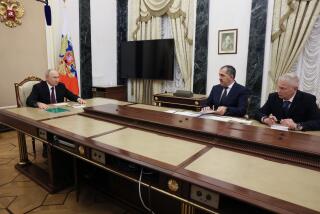Gorbachev Ousts KGB’s Ruling Body
- Share via
MOSCOW — Soviet President Mikhail S. Gorbachev on Wednesday crippled a vital leg of the Kremlin power troika that tried to overthrow him, disbanding the KGB’s ruling body and ordering an investigation into its role in last week’s failed coup.
The embattled yet ever-defiant Gorbachev has already wrenched the Communist Party’s grip from the reins of power by resigning as party leader, severing the political organization from the presidency.
The authority of the Soviet army--the third key support in the Kremlin hierarchy--has also been damaged by military involvement in the abortive putsch.
In a coordinated effort to shackle the feared secret police agency, Gorbachev issued decrees firing two deputy ministers for state security, dissolving the KGB collegium and deputizing a 10-man political investigative team to probe the agency’s activities during the three-day coup attempt.
The moves appear to be a further effort by Gorbachev to restore his authority by purging opponents and unreliable lieutenants after the Aug. 19 coup by party hard-liners who sought to reimpose Stalinist rule.
Gorbachev’s political assault on the KGB may ensure that neither he nor any future leader is again vulnerable to collusion among the security police, the army and the party.
In one of the most symbolic strikes at the hated network whose ruthlessness once transfixed Soviet citizens in terror, thousands of Muscovites cheered last Friday as angry demonstrators toppled the 14-ton statue of KGB founder Felix E. Dzerzhinsky from its giant pedestal in front of the agency’s imposing headquarters, Lubyanka.
Gorbachev earlier announced that the KGB’s estimated 230,000 troops will be transferred to the control of the Defense Ministry, depriving the shadowy security force of much of its armed might.
Four KGB generals, including former agency chief Vladimir A. Kryuchkov, have been arrested for supporting the renegade Communists in their unlawful effort to seize power.
Kryuchkov was one of the eight Kremlin conservatives who tried to oust Gorbachev by announcing 10 days ago that they were taking over the leadership and invoking a state of emergency. The former KGB leader has been jailed along with the other coup plotters. They face a charge of high treason, for which they could be executed, if convicted.
Most of the KGB’s security department, known as the Ninth Directorate, has been sacked for suspected complicity in the coup attempt, the Moscow newspaper Moskovsky Komsomolets has reported. The directorate provides security for Soviet leaders, and members of Gorbachev’s own personal guard reportedly helped the coup masters penetrate his Crimean vacation retreat and take control of all communications.
The head of Gorbachev’s security guard, KGB Lt. Gen. Yuri S. Plekhanov, was arrested shortly after the coup collapsed. On the orders of Gorbachev, Kryuchkov’s chief deputy, Viktor Grushko, and another top KGB figure were fired Wednesday, the official Tass news agency said. Grushko’s office had been searched a day earlier, when investigators presumably collected evidence linking him with the coup.
Lt. Gen. Vitaly Prilukov was dismissed as deputy chief of the KGB in charge of the Moscow region, Tass said. Prilukov was apparently responsible for deploying elite KGB troops in the capital last week in a failed challenge to those who sided with Russian Federation President Boris N. Yeltsin in resisting the coup.
An unidentified KGB spokesman was quoted by Reuters news agency as saying the entire ruling collegium of the secret police was fired Wednesday and that Grushko, one of its members, was under arrest. Destruction of the collegium eliminates a critical power structure in the KGB that may allow the agency’s new chief, Vadim V. Bakatin, to reform the service more swiftly.
In an interview on the Russian Federation news program “Vesti,” Bakatin said late Wednesday that he had been pressing Gorbachev to liquidate the KGB when he was asked to take the reins after Kryuchkov’s arrest and oversee a wholesale restructuring of the agency.
Bakatin described the KGB as “an enormous monopoly” in need of major reform, although he said he staunchly opposes the idea of opening agency records to public inspection.
The KGB and similar secret police networks it sponsored in Eastern Europe depended for decades on squads of snitches and stooges for incriminating reports on dissidents and other political opponents.
Gorbachev has asked the investigation team to report to him by Oct. 26 on the KGB’s role in the coup attempt. He also gave the group of five Soviet and five Russian legislators the task of outlining new laws to regulate the KGB’s future activities.
More to Read
Sign up for Essential California
The most important California stories and recommendations in your inbox every morning.
You may occasionally receive promotional content from the Los Angeles Times.














